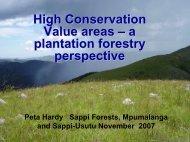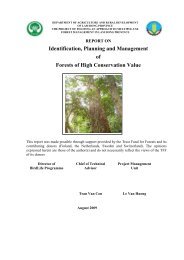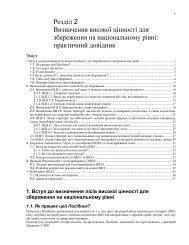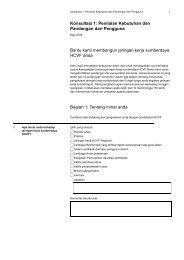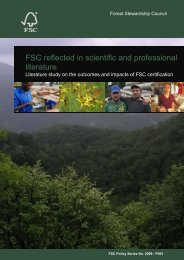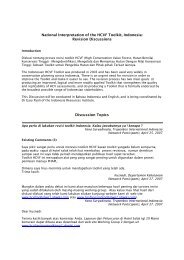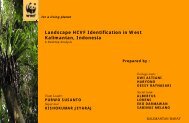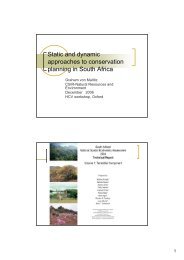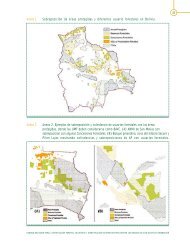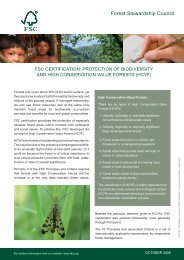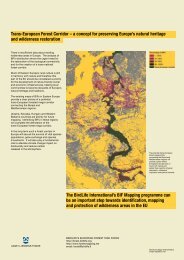Forests Sourcebook - HCV Resource Network
Forests Sourcebook - HCV Resource Network
Forests Sourcebook - HCV Resource Network
You also want an ePaper? Increase the reach of your titles
YUMPU automatically turns print PDFs into web optimized ePapers that Google loves.
CHAPTER 6<br />
Mainstreaming <strong>Forests</strong> into<br />
Development Policy and Planning<br />
One of the targets under the Millennium Development<br />
Goals for ensuring environmental sustainability<br />
requires that countries integrate the principles<br />
of sustainable development into country policies and<br />
programs and reverse the loss of environmental resources.<br />
In line with this, macro policy reforms should give foremost<br />
consideration to ensuring enabling conditions for sustainable<br />
development, enhancing synergies and minimizing<br />
negative impacts on natural resources. For forests, the combined<br />
impacts of economic activities outside the forest sector<br />
are often significantly greater than those produced by<br />
economic activity within the sector itself.<br />
Several policy areas can impact forests and forest development,<br />
including macroeconomic policies (fiscal, monetary,<br />
trade, privatization, and public expenditure policies);<br />
population and social affairs; agriculture, fisheries, game<br />
management, livestock; rural and regional development,<br />
land use planning, land tenure; infrastructure; industry;<br />
energy; environment 1 ; and tourism. Macro policy reforms<br />
are central to strengthening an economy. Governments<br />
reform fiscal, exchange rate, and monetary policies, and<br />
make changes in trade policies, land reform, and privatization<br />
policies as part of adjustment packages to address economic<br />
imbalances, balance of payments, and structural<br />
weaknesses in their economy. Measures such as these—<br />
regardless of origin—can and do have significant impacts<br />
on natural resources in general. For example, real exchange<br />
rate depreciation (currency devaluation) favors the expansion<br />
of tradables (many agricultural, forest, and mineral<br />
products) over nontradables (services, construction, and<br />
subsistence production). That generally encourages expansion<br />
of agriculture, logging, and mining. In addition, it can<br />
also boost sectors that use more land and labor and less<br />
imported capital and might, therefore, encourage more<br />
extensive agriculture. Conversely, exchange rate depreciation<br />
sometimes induces farmers to shift to export crops or<br />
production systems that require less land.<br />
Fiscal policy directed at short-run stabilization, the<br />
implementation of growth and other long-term objectives,<br />
and decentralization policy (see note 5.1, Decentralized Forest<br />
Management) as a major instrument of national economic<br />
reform in many developing countries and countries<br />
in transition, all can affect forests and other natural<br />
resources. Such broadly based adjustments, which were<br />
often part of stabilization and structural adjustment policies<br />
recommended by the World Bank and, more often, the<br />
International Monetary Fund (IMF), have in the past been<br />
criticized for their negative impacts on the poor, on natural<br />
resources, and on the environment (see box 6.1). In the<br />
recent past, development policy decreased emphasis on<br />
restoring balance of payment and exchange rates, and<br />
focused on budget support geared toward domestic financing<br />
needs. The World Bank’s development policy lending<br />
(DPL) portfolio has included promoting competitive market<br />
structures, correcting distortions in incentive regimes,<br />
establishing appropriate monitoring and safeguards in the<br />
financial sector, judicial reform, and adopting modern<br />
investment codes to create an environment conducive to<br />
203



